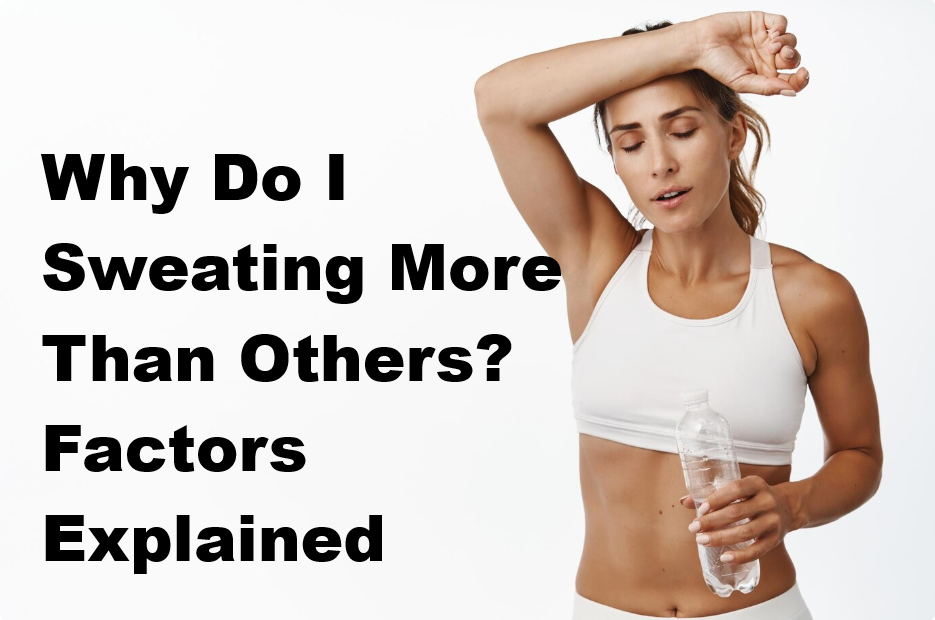Sweating is a natural body function that helps regulate temperature, but not everyone sweats equally. You might be wondering, “Why do I sweat more than others?” or “Is it true that healthy people sweat more?” If you’ve ever asked yourself these questions, you’re not alone. Understanding the factors behind excessive sweating can help you find answers to these common concerns.
In this blog post, we will explore the reasons why some people sweat more than others, whether it’s linked to health or genetics, and if sweating more is a sign of fitness. We’ll also answer some common myths about sweating and fat loss.
Table of Contents
- What is Sweating?
- Why Do I Sweat More Than Others?
- Is It True That Healthy People Sweat More?
- Can Genetics Affect Sweating?
- Does Sweating More Mean More Calorie Burn?
- Do Unfit People Sweat More?
- How to Manage Excessive Sweating?
- Conclusion

What is Sweating?
Sweating is a process that helps your body maintain a stable internal temperature. It occurs when your body gets too hot, whether from exercise, high temperatures, or stress. Sweat glands in the skin secrete fluid (mostly water) that evaporates and cools the body. There are two main types of sweat glands:
- Eccrine Glands: Found all over the body, primarily on your palms, forehead, and soles of your feet.
- Apocrine Glands: Found in areas like the armpits and groin, these glands produce a thicker sweat that can lead to body odor.
Why Do I Sweat More Than Others?
The amount you sweat can vary greatly from person to person. If you sweat more than your friends, there could be several factors at play:
1. Genetics
Your genetic makeup plays a major role in how much you sweat. Some individuals are born with more sweat glands, and these glands may be more active. If your parents tend to sweat heavily, there’s a good chance you might as well.
2. Body Size
Larger people tend to sweat more because their bodies generate more heat. More body mass means more heat production, which requires more sweating to cool down the body.
3. Health Conditions
Certain medical conditions can make you sweat more than usual. For example, hyperhidrosis is a condition characterized by excessive sweating, often without any apparent trigger. Other conditions like obesity, thyroid disorders, or anxiety can also lead to increased sweating.
4. Fitness Level
A person’s fitness level can also affect sweating. Those who are physically fit may sweat more efficiently as their bodies become more accustomed to exercise. Regular physical activity can increase sweat production as your body learns to cool itself more effectively.
5. Environmental Factors
The climate you live in can also impact how much you sweat. If you live in a hot, humid environment, your body will naturally sweat more to regulate its temperature.

Is It True That Healthy People Sweat More?
Many people believe that healthy individuals sweat more, and there is some truth to this. When you are physically fit, your body becomes more efficient at cooling itself down. Exercise-induced sweating is a sign that your body is adjusting to the increased demands placed on it during physical activity.
As your fitness improves, your body learns to cool itself down faster, which can lead to earlier and more frequent sweating during exercise. However, this doesn’t mean that sweating more directly correlates with better health—it’s simply an indication that your body is becoming more efficient at thermoregulation.
Can Genetics Affect Sweating?
Yes, genetics can significantly influence how much you sweat. Some people are genetically predisposed to have more active sweat glands. This means they may sweat more frequently or more intensely than others. Additionally, primary hyperhidrosis, a genetic condition, causes excessive sweating, often localized to areas like the hands, feet, and armpits.
Certain genetic factors can also affect the odor of sweat. While sweat itself is odorless, bacteria on the skin break down sweat from apocrine glands, resulting in body odor. Genetic variations can influence how strongly this odor is perceived.

Does Sweating More Mean More Calorie Burn?
A common misconception is that sweating more means you are burning more calories or fat. In reality, sweating is your body’s cooling mechanism, not an indicator of fat loss. When you sweat, you lose water weight—not fat.
Fat loss occurs when you create a calorie deficit (burning more calories than you consume), typically through exercise and diet. While you may sweat more during a high-intensity workout, the amount of sweat you produce doesn’t directly correlate to fat burning.
Do Unfit People Sweat More?
Interestingly, people who are less fit may sweat more, especially during the initial stages of exercise. When you’re out of shape, your body struggles more to regulate temperature, leading to more sweat. Over time, as you become more conditioned, your body will sweat less at lower intensities because it’s better at maintaining homeostasis.
As you continue to exercise, your cardiovascular system becomes more efficient, and your body learns to cool itself down faster. This means that in the long run, unfit people may sweat more, but a fitter person will sweat more efficiently.
How to Manage Excessive Sweating?
If you feel like you’re sweating too much, there are several strategies you can use to manage it:
- Stay Hydrated: Proper hydration helps your body regulate temperature more efficiently.
- Wear Breathable Clothing: Fabrics like cotton and moisture-wicking materials can help keep you dry and comfortable.
- Use Antiperspirants: Medical-grade antiperspirants can block sweat glands and reduce sweating.
- Consult a Doctor: If excessive sweating is affecting your quality of life, talk to a healthcare provider. Conditions like hyperhidrosis can be treated with therapies, medications, or even surgery.
Conclusion
Sweating is a natural and necessary process, but its intensity varies from person to person. Whether you sweat more due to genetics, fitness level, or environmental factors, understanding the science behind sweating can help you make sense of your body’s response to temperature and physical activity.
Remember, sweating doesn’t necessarily equate to fat loss or calorie burning, and it’s not always an indicator of better health. While some people sweat more than others, it’s just one of many unique traits that make us who we are.
If you’re concerned about excessive sweating, don’t hesitate to consult with a healthcare professional to determine if there are any underlying health conditions at play.

2 thoughts on “Why Do I Sweating More Than Others? Factors Explained”